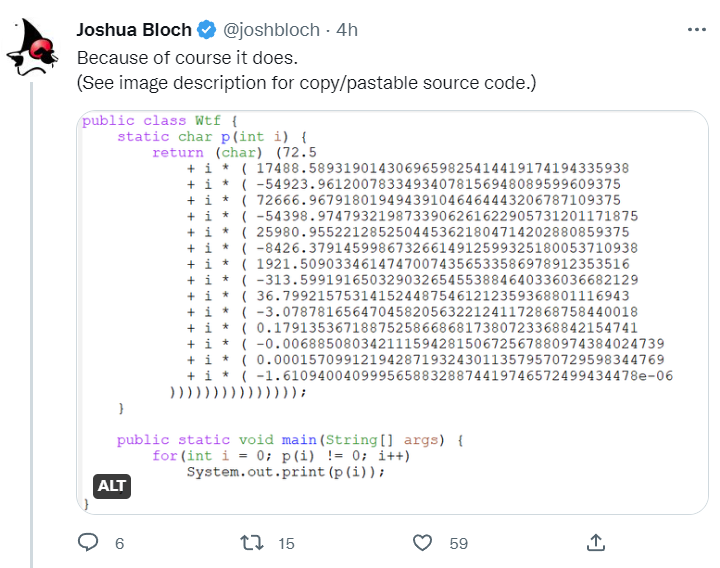Fun with obfuscated Groovy™
Published: 2022-12-08 12:40AM
An interesting tweet appeared in my feed this morning:

And of course it prints the same thing in Groovy:
char p(int i) {
(char) (72.5
+ i * (17488.589319014318
+ i * (-54923.96120078333
+ i * (72666.96791801952
+ i * (-54398.97479321991
+ i * (25980.955221285272
+ i * (-8426.37914599868
+ i * (1921.5090334614745
+ i * (-313.59919165032926
+ i * (36.799215753141524
+ i * (-3.0787816564704586
+ i * (0.17913536718875267
+ i * (-0.0068850803421115925
+ i * (1.5709912194287188E-4
+ i * (-1.6109400409995646E-6
)))))))))))))))
}
var i = 0
while (p(i)) print p(i++)STOP reading now and try it out for yourself … or browse the possible origin
SPOILER ALERT okay, if you didn’t stop, I guess it’s still okay to scroll down to see what it prints out and how to create an obfuscated script yourself…
↓
↓
↓
Let’s Groovify the reply from Alexey Nikitin which uses Apache Commons Math to replicate the problem:
@Grab('org.apache.commons:commons-math3:3.6.1')
import org.apache.commons.math3.analysis.interpolation.NevilleInterpolator
var text = 'Hello, world!\n'
var size = text.size()
var x = new double[size + 1]
var y = new double[size + 1]
for(i in 0..<size) {
x[i] = i
y[i] = (int) text[i]
}
x[size] = size
y[size] = 0
var lines = []
var interpolator = new NevilleInterpolator()
var function = interpolator.interpolate(x, y)
var coeff = function.coefficients
lines << 'char p(int i) {'
lines << " (char) (${coeff[0]} + 0.5"
for(i in 1..<coeff.length) {
lines << ' + i * (' + coeff[i]
}
lines << ' ' + ')' * coeff.length
lines << '''}
var i = 0
var out = ''
while(p(i)) out += p(i++)
out
'''
var script = lines.join('\n')
println script
assert text == Eval.me(script)This generates the script, prints it out, and then runs it to make sure it produces what we intended. It only differs from above in that instead of printing out each character, it builds up and returns a String so that we can assert our expectations. It was simpler than capturing stdout by other means.
Enjoy!
